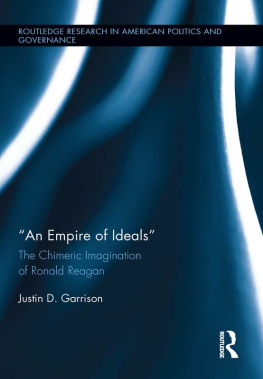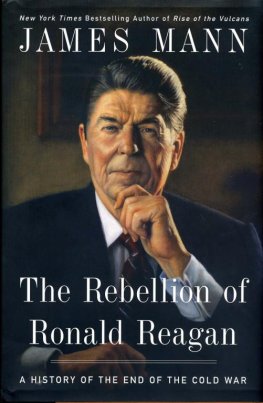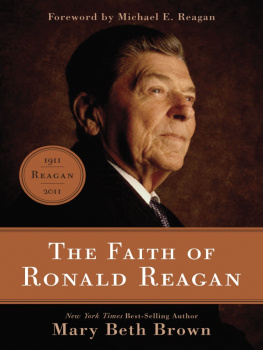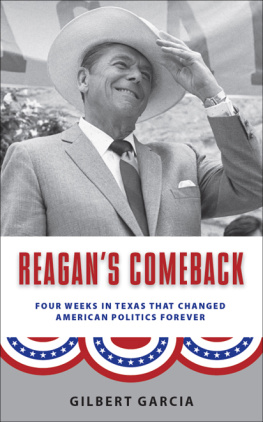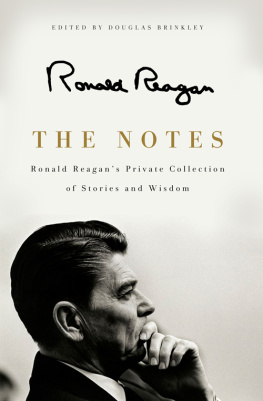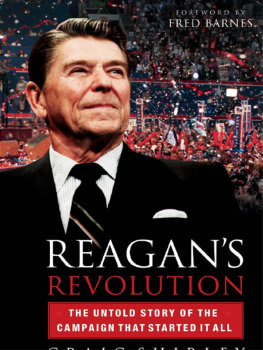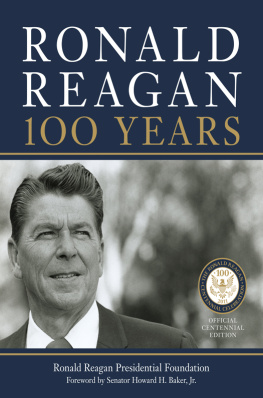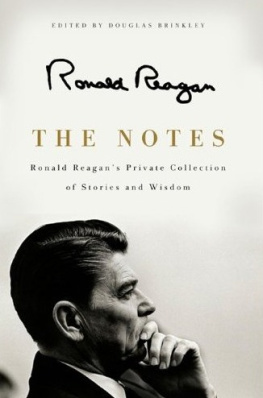An Empire of Ideals
Garrison has produced the most penetrating and finest analysis of Ronald Reagan's rhetoric. His findings are bound to surprise many and even shock some.
George W. Carey, Georgetown University
Justin Garrison's highly original work explodes conventional categorizations about Ronald Reagan's politics and governing philosophy. Using Reagan's own words, Garrison makes the provocative, yet ultimately convincing, case that the icon of modern conservatism was actually an adherent of the ideas of a variety of thinkers, including even leading progressive ones. I commend this work to scholars and students of the presidency, rhetoric, and political philosophy.
Mark J. Rozell, George Mason University
An Empire of Ideals provides an original and groundbreaking analysis of Ronald Reagan's imagination as it was expressed mainly in his presidential speeches. The book argues that the predominant strain of Reagan's imagination is chimericthat is, imbued with a high degree of optimism, romantic dreaminess, naivet, and illusion. Justin D. Garrison challenges a number of existing assumptions about Reagan. Among other things, he draws into question Reagan's self-proclaimed status as a conservative and as a faithful adherent to the ideas of the American Founding. The book concludes that Reagan's vision contains many dubious elements that present dangers for practical politics. It also claims that the popularity of Reagan's imagination among Americans suggests a problematic self-understanding.
Surpassing existing works on Reagan's ideas and speeches, the book systematically explains the general quality and major components of Reagan's vision, and it draws upon political theory, aesthetics, and American political thought to analyze his imagination. Although the book is a rigorous work of scholarship, it is not a highly technical study accessible only to academic specialists. It will be of deep interest to general readers as well as scholars.
Justin D. Garrison earned his doctorate in political theory from Catholic University. His research and teaching interests include political theory, American political thought, literature and politics, and aesthetics and politics. He will be joining the faculty at Roanoke College as an assistant professor of political science in the fall of 2013.
Routledge Research in American Politics and Governance
1 Lobbying the New President
Interests in Transition
Heath Brown
2 Religion, Race, and Barack Obamas New Democratic Pluralism
Gastn Espinosa
3 Direct Democracy in the United States
Petitioners as a Reflection of Society
Shauna Reilly and Ryan M. Yonk
4 American Exceptionalism in the Age of Obama
Stephen Brooks
5 An Empire of Ideals
The Chimeric Imagination of Ronald Reagan
Justin D. Garrison
An Empire of Ideals
The Chimeric Imagination of Ronald Reagan
Justin D. Garrison
First published 2013
by Routledge
711 Third Avenue, New York, NY 10017
Simultaneously published in the UK
by Routledge
2 Park Square, Milton Park, Abingdon, Oxon OX14 4RN
Routledge is an imprint of the Taylor & Francis Group, an informa business
2013 Taylor & Francis
The right of Justin D. Garrison to be identified as author of this work has been asserted by him in accordance with sections 77 and 78 of the Copyright, Designs and Patents Act 1988.
All rights reserved. No part of this book may be reprinted or reproduced or utilised in any form or by any electronic, mechanical, or other means, now known or hereafter invented, including photocopying and recording, or in any information storage or retrieval system, without permission in writing from the publishers.
Trademark Notice: Product or corporate names may be trademarks or registered trademarks, and are used only for identification and explanation without intent to infringe.
Library of Congress Cataloging in Publication Data
Garrison, Justin D.
An empire of ideals: the chimeric imagination of Ronald Reagan /
Justin D. Garrison.
pages cm. (Routledge research in American politics and
governance ; 5)
1. Reagan, RonaldLanguage. 2. Reagan, RonaldRhetoric.
3. RhetoricPolitical aspectsUnited StatesHistory20th
century. 4. Communication in politicsUnited StatesHistory20th
century. 5. National characteristics, AmericanPolitical aspects
History20th century. 6. OptimismPolitical aspectsUnited
StatesHistory20th century. 7. United StatesPolitics and
government19811989. I. Title.
E877.2.G38 2013
973.927092dc23
2012039929
ISBN: 0-415-81848-3 (hbk)
ISBN: 0-203-58123-0 (ebk)
Typeset in Sabon
by Apex CoVantage, LLC
To my wife, Laura
Contents
Permissions
Babbitt, Irving. Democracy and Leadership. Copyright 1952 by National Humanities Institute. Used with permission from National Humanities Institute.
Garrison, Justin. The Land of Limitless Possibilities: Ronald Reagan, Progress, Technology, and the Modest Republic, in The Culture of Immodesty in American Life and Politics. Edited by Michael P. Federici. ISBN HB 978-0-230-34077-0. Copyright 2013 by Palgrave Macmillan. Portions of The Land of Limitless Possibilities reprinted with permission of Palgrave Macmillan.
Garrison, Justin. A Covenant with All Mankind: Ronald Reagan's Idyllic Vision of America in the World. Humanitas vol. 21, nos. 1 and 2 (2008): 3463. Portions of A Covenant with All Mankind reprinted with permission of Humanitas.
Acknowledgements
I would like to thank Routledge and its staff for all their help during the editing, production, and publishing stages of this book. The independent reviews of the manuscript commissioned by the publisher were particularly valuable. I would also like to thank the academic journal Humanitas for granting me permission to reprint parts of my article A Covenant with All Mankind: Ronald Reagan's Idyllic Vision of America in the World and Palgrave Macmillan for granting me permission to reprint parts of my book chapter The Land of Limitless Possibilities: Ronald Reagan, Progress, Technology, and the Modest Republic.
In conceptualizing, researching, and writing this book, I have drawn upon the wisdom of a number of people, including Michael P. Federici of Mercyhurst University, Phillip G. Henderson of the Catholic University of America, George W. Carey of Georgetown University, and David Richards. Michael Federici introduced me to political theory as an undergraduate. He made many astute observations on different chapters in this book and directed my attention to a number of ideas, texts, and thinkers relevant to explaining and analyzing Reagan's imagination. Phil Henderson's scholarship and advice gave me a better understanding of the American presidency, which, in turn, allowed me better to interpret Reagan. George Carey's scholarship has shaped to a great extent my understanding of American political thought and the American Framing. His comments on various parts of this book enabled me to explore more effectively the American historical resonances of Reagan's intuitive vision. David Richards gave me many keen insights into Reagan and his significance for understanding American culture. I am thankful for all of the assistance rendered by these colleagues and friends.

